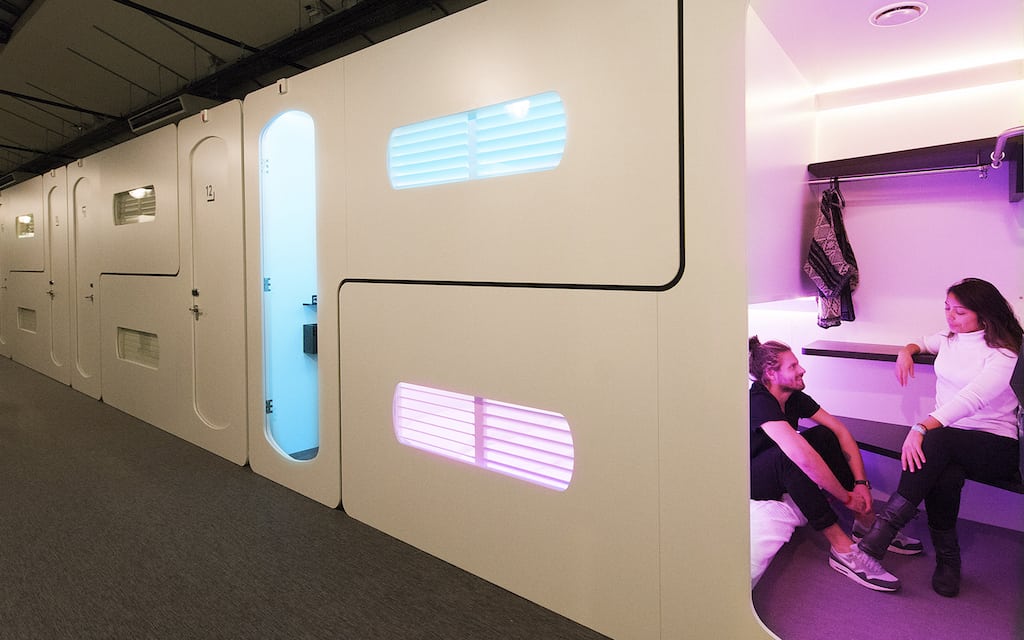Skift Take
CityHub is taking the best of capsule hotels and combining this with learnings that smart hostel companies like Generator have gleaned over the past two years.
CityHub is a new hospitality brand that launched in Amsterdam on October 30 with a creative design model aimed at urban travelers seeking clean, affordable, central, social, and private accommodations.
Housed inside a restored 100-year-old warehouse, CityHub consists of 50 prefab “hubs” with a bed, bench, Wi-Fi, kimonos, and mood lighting controlled by the CityHub app. There is only one room size, sleeping one or two people, which helps maximize efficiency in construction, scalability and operations.
To save space in each guest room, CityHub has a smartly designed communal bathroom for everyone to share.
For now, the average nightly room rate in Amsterdam is around $65-$75, but prices fluctuate between $45 to $110 per unit based on demand and preferred dates.
“We felt there was a big gap between hostels and hotels basically,” co-founder Sem Schuurkes told Skift. “Hostels are usually like a shared dorm, and they have a good vibe and a good price, but generally they’re often very dirty, and you have to share a room. And then if you want something private, you end up with a hotel, which is very often formal and expensive and boring.”
The marketplace segment is clearly defined, and if this concept can scale, there’s a definite sweet spot in the hospitality sector that has been largely unfulfilled to date. CityHub is like a hostel in terms of the social guest experience and price point, but the 100% privacy factor across the entire room spectrum separates it from the hostel model.
Furthermore, CityHub differentiates itself from brands like The Pod Hotel because it’s not trying to be a hotel with really small rooms. The physical design of the hubs leans slightly more toward Japan’s capsule hotel product, but without the deep space hibernation feel of 2001 Space Odyssey.
A Hub in the City
When CityHub guests first arrive, they check in at a kiosk with three clicks. That activates the guest’s wristband that operates as both a room key and a charging card for on-property purchases.
The check-in process also automatically enters guests as members of the CityHub app but only for the duration of their stay. Schuurkes compares the CityHub digital platform to a WhatsApp group where members can communicate with each other in-app.
“We also have 24/7 hosts,” he explained. “They’re locals and they can tell you the cool places to go, also through the app. The city is basically our lobby.”
In effect, CityHub guests have an on-demand, around-the-clock, live digital concierge that they can reach out to on a whim. Although, it seems there’s going to be guests with a few too many drinks pinging the CityHub hosts constantly at 3 a.m. with all kinds of crazy questions, but then again, we’ve all been there.
A main priority during the design phase was to deliver a socially dynamic cowork space ambience, like you find at most hostels, except CityHub also has a self-serve “Hangout” bar. Guests simply swipe their wristbands beside the dispensers to pour their own beer or make their own cocktails.
Schuurkes told us, “The whole CityHub is basically run from the cloud so there’s no operational human intervention.”
Exporting CityHub
Beyond the innovative room product and guest experience, the business model is interesting because the physical hubs are constructed offsite as modular components. Each piece is designed so it can be carried by two people through any door in any building, and then the pieces are put together like an industrial IKEA closet.
The hubs fit together so each bed in each unit sits above or below the adjacent hub. Some people like the top, some people like the bottom, as the enthusiastic brand video (above) explains.
“The benefit of the system is we can occupy buildings that nobody else can use, like the warehouse we’re in now,” Schuurkes said. “We don’t have to add any major construction, like building floors or that kind of thing.”
He also said he’s already getting inquiries for CityHub franchises from groups in San Francisco, Los Angeles and Australia. But right now he’s focusing on expanding in primary European capitals, including London, Paris, Barcelona and Berlin.
The challenge to scale CityHub revolves around the low price point and high property costs inherent in major urban cores. The demand is certainly there for a new guest experience marrying affordability, modernity and connectivity in the pursuit of seamless urban integration.
Plus it’s just a hell of a lot of fun if you don’t mind walking down the hall in a kimono to the communal bathrooms.
“The bathrooms are very high luxury with soap, shampoo, hairdryers—it’s all there,” said Schuurkes. “The funny thing is the women and men are often in separate groups at CityHub, but you get them together in the bathroom and now it’s become kind of a social area in front of the mirror there.”
Have a confidential tip for Skift? Get in touch
Tags: amsterdam, europe, hostel
Photo credit: CityHub's room product is all the same size, sleeping one or two people. CityHub
